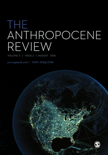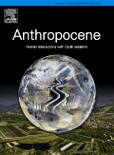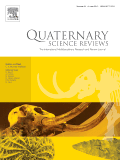
Anthropocene Review
Scope & Guideline
Exploring the Impact of Humanity on Our Planet
Introduction
Aims and Scopes
- Interdisciplinary Research:
The journal encourages interdisciplinary collaborations that span ecology, sociology, anthropology, economics, and political science, reflecting the diverse impacts of human activity on the Earth. - Critical Examination of Anthropocene Concepts:
It focuses on critically analyzing and redefining concepts related to the Anthropocene, such as climate change, sustainability, and ecological restoration, often challenging established narratives. - Socio-ecological Perspectives:
The journal emphasizes the relationship between social systems and ecological processes, exploring how human societies adapt to and shape their environments. - Policy and Governance Insights:
Research published often delves into the implications of environmental policies and governance frameworks in managing ecological crises and promoting sustainable development. - Cultural and Ethical Dimensions:
It highlights the cultural, ethical, and philosophical implications of the Anthropocene, examining how narratives and values influence human-environment interactions.
Trending and Emerging
- Climate Justice and Equity:
Recent publications increasingly address the intersection of climate change with social justice, focusing on how marginalized communities are disproportionately affected by environmental degradation. - Posthumanism and Non-Human Agency:
There is a growing interest in posthumanist perspectives that explore the agency of non-human entities and their roles in ecological systems, challenging anthropocentric viewpoints. - Indigenous Knowledge and Practices:
The incorporation of Indigenous knowledge systems and practices in understanding and addressing Anthropocene challenges is gaining traction, reflecting a broader recognition of diverse epistemologies. - Technological Impacts on Society and Environment:
Emerging themes explore the implications of new technologies, such as AI and biotechnologies, on environmental sustainability and societal structures, emphasizing the need for critical assessments. - Narratives of Hope and Resilience:
A shift towards narratives that emphasize resilience, adaptation, and hopeful futures in the face of environmental crises is becoming more prominent, promoting constructive dialogues around sustainability.
Declining or Waning
- Historical Analysis of Past Epochs:
While historical perspectives on environmental changes have been important, there seems to be a decline in papers solely focused on historical analyses of ecological conditions prior to the Anthropocene. - Purely Technical Solutions to Environmental Issues:
There appears to be a waning focus on purely technical fixes for environmental problems, such as geoengineering, in favor of more holistic approaches that consider social and ethical dimensions. - Descriptive Studies of Ecosystems:
Research that primarily describes ecosystems without integrating socio-political contexts or human influences is becoming less common, as the journal shifts towards more integrative and critical frameworks. - Narrowly Defined Environmental Issues:
Topics that isolate specific environmental issues without connecting them to broader societal impacts or Anthropocene narratives are less frequently published, indicating a preference for comprehensive analyses.
Similar Journals

NEW ZEALAND JOURNAL OF ECOLOGY
Exploring New Zealand's Ecological FrontiersNEW ZEALAND JOURNAL OF ECOLOGY, published by the New Zealand Ecological Society, stands as a premier platform for disseminating research in the field of ecology, with a notable impact factor reflected in its Q2 ranking in multiple ecology categories for 2023. Established in 1980 and actively publishing since 1982, this journal provides a vital resource for ecologists and environmental scientists, fostering the exchange of innovative ideas and methodologies. The journal covers a wide range of ecological topics, ensuring a comprehensive overview of the current trends and research developments in both ecological theory and practical applications specific to New Zealand and beyond. Researchers, professionals, and students will find in this journal an authoritative source to advance their understanding of ecological dynamics and contribute to the growing field of ecological science. The journal is accessible to the community without open access, providing critical insights that underpin the ecological landscape of New Zealand and inform sustainable practices worldwide.

Neotropical Biodiversity
Fostering collaboration for ecological resilience in the Neotropics.Neotropical Biodiversity is a prominent journal dedicated to advancing our understanding of biodiversity and ecological dynamics within the Neotropical region. Published by TAYLOR & FRANCIS LTD in the United Kingdom, this Open Access journal has been providing unrestricted access to research findings since 2015, fostering collaboration and knowledge sharing among the global scientific community. With an emphasis on innovative research in Ecology, Ecology, Evolution, Behavior and Systematics, and Global and Planetary Change, it has earned a reputation for excellence, currently holding a Q3 category in its field. As of 2023, the journal ranks in the 37th percentile for Environmental Science (Ecology) and in the 36th percentile for Agricultural and Biological Sciences (Ecology, Evolution, Behavior and Systematics), making it a valuable resource for researchers, professionals, and students interested in understanding and preserving biodiversity in one of the world's most diverse ecosystems. We invite you to explore the cutting-edge research published in Neotropical Biodiversity and contribute to the ongoing dialogue for environmental sustainability and ecological resilience.

Visnyk of V N Karazin Kharkiv National University-Series Geology Geography Ecology
Bridging disciplines to enhance our understanding of Earth's systems.Visnyk of V N Karazin Kharkiv National University-Series Geology Geography Ecology is a prominent academic journal dedicated to the fields of geology, geography, and ecology. Published by the esteemed V N Karazin Kharkiv National University, this journal aims to disseminate high-quality research findings and theoretical perspectives that advance understanding in these critical scientific areas. With the ISSN 2410-7360 and E-ISSN 2411-3913, it serves as a vital platform for scholars, researchers, and students striving to contribute to environmental science and sustainable development. The journal promotes open access, ensuring that research is readily accessible to a broad audience, thus facilitating the exchange of knowledge across borders. Its commitment to scholarly excellence makes it an essential resource for anyone engaged in the study of Earth's systems and their interconnections. For additional information and to submit your research, please visit the journal's website.

NORTHWEST SCIENCE
Empowering researchers with vital insights from the Northwest.NORTHWEST SCIENCE, published by the NORTHWEST SCIENTIFIC ASSOCIATION, serves as a vital resource for researchers and professionals in the fields of ecology, evolution, and systematics. With an ISSN of 0029-344X and an E-ISSN of 2161-9859, this journal has been disseminating valuable scientific insights since its inception in 1975 and continues to do so into 2024. Although currently positioned in the Q4 quartile for its category, it plays a crucial role in advancing the understanding of ecological and biological sciences, reflecting a diverse range of studies and methodologies. Researchers will find the journal particularly appealing due to its emphasis on regional studies and their implications on a global scale. While NORTHWEST SCIENCE is not an open-access publication, it provides significant contributions to the academic dialogue within its discipline, making it an essential addition to the library of any dedicated researcher, student, or professional in the environmental sciences.

Anthropocene
Connecting Scholars to Address Global Ecological CrisesAnthropocene, published by Elsevier Science Ltd, is a leading journal dedicated to the interdisciplinary study of the Anthropocene epoch, focusing on the profound impacts of human activity on Earth systems and ecosystems. With an impressive impact factor reflected in its Q1 rankings in Earth and Planetary Sciences and Ecology, as well as a solid standing in Global and Planetary Change, this journal is a vital resource for researchers, professionals, and students striving to understand and address the pressing environmental challenges of our time. Since its inception in 2013, the journal has been committed to publishing high-quality, peer-reviewed articles that stimulate critical discourse and inspire innovative solutions to complex ecological issues. Although not an open-access journal, Anthropocene provides extensive access options through institutional subscriptions, making its significant research readily available to the academic community. Based in the United Kingdom, the journal serves as a cornerstone for scholarship in a rapidly evolving field, bridging gaps across disciplines and encouraging interdisciplinary collaboration for a sustainable future.

One Earth
Advancing the frontiers of Earth and Environmental Science.One Earth is a premier academic journal published by Cell Press, dedicated to advancing research in the fields of Earth and Planetary Sciences as well as Environmental Science. With an impactful presence in the academic community and an impressive ranking, One Earth has achieved Q1 status in both Earth and Planetary Sciences and Environmental Science, showing its commitment to the highest standards of scholarly excellence. Founded in 2019, this journal has quickly established itself as a leading platform for groundbreaking research, contributing to the global conversation on sustainability and environmental stewardship. With a distinguished Scopus rank placing it in the 99th percentile among Earth and Planetary Sciences and the 97th percentile in General Environmental Science categories, One Earth aims to disseminate cutting-edge findings and foster innovative approaches to address pressing global challenges. The journal is indexed with an ISSN of 2590-3330 and an E-ISSN of 2590-3322, supporting a broad audience of researchers, professionals, and students passionate about ecological integrity and planetary health.

Earth Interactions
Pioneering Insights into Earth and Planetary SciencesEarth Interactions is a prominent journal that serves as a critical platform for interdisciplinary research in the field of Earth and Planetary Sciences. Published by the American Meteorological Society, this journal has established itself as a key resource for scholars, researchers, and professionals dedicated to understanding Earth's complex systems and their interactions. With an impressive Q1 ranking in the category of Earth and Planetary Sciences for 2023, it reflects a commitment to high-quality scholarship and impactful contributions to the field. The journal, with its dedicated coverage from 2004 to 2024, encompasses a wide array of topics, providing comprehensive insights into geological, atmospheric, and environmental phenomena. Although it operates under a non-open access model, its significance is underscored by its placement in the top percentile of Scopus rankings (Rank #89/195), making it an exciting resource for those pursuing advanced studies and applications related to Earth's systems.

Quaternary Science Reviews
Decoding the Complexities of Earth’s Recent HistoryQuaternary Science Reviews is a premier international journal published by PERGAMON-ELSEVIER SCIENCE LTD, dedicated to the multidisciplinary study of the Quaternary period and its implications across a variety of scientific fields, including archaeology, geology, ecology, and environmental science. With an impressive impact factor that places it in the Q1 quartile across multiple categories such as Archaeology, Ecology, and Geology, it stands as a beacon of scholarly excellence. The journal, which has been in circulation since 1982 and converges its knowledge through to 2024, is instrumental for researchers and professionals seeking to explore the complexities of climate change, biodiversity, and earth systems. Though it does not currently offer Open Access options, its well-curated content remains vital for academic advancement and is accessible to a broad audience through institutional subscriptions. Positioned at the forefront of modern scientific inquiry, the journal fosters an environment for sharing pivotal findings and fostering intellectual discussions, making it an indispensable resource for students, practitioners, and researchers alike.

Geosciences
Uncovering Geological Insights for a Sustainable Future.Geosciences is a prestigious open-access journal published by MDPI, dedicated to advancing research in the field of Earth and Planetary Sciences. Since its inception in 2011, this journal has fostered a collaborative environment for the dissemination of innovative ideas and findings, contributing significantly to the academic community's understanding of complex geological processes. The journal has achieved a commendable 2023 ranking in the second quartile (Q2) within its category, highlighting its impact and relevance in the field, with a Scopus rank of #41 out of 195 journals, placing it in the 79th percentile. With an aim to span a broad range of topics from environmental geology to planetary exploration, Geosciences is pivotal for researchers, professionals, and students looking for an accessible platform to share their work and stay informed of the latest developments. As a fully open-access journal, it ensures that high-quality research is freely available, fostering greater dissemination of knowledge across the globe.

ENVIRONMENT AND HISTORY
Navigating the Complexities of Environment and SocietyENVIRONMENT AND HISTORY is a distinguished academic journal published by WHITE HORSE PRESS, focusing on the interdisciplinary study of environmental history and the intricate relationships between human societies and their environments. With an ISSN of 0967-3407 and an E-ISSN of 1752-7023, this journal serves as a vital platform for researchers, professionals, and students engaged in Arts and Humanities, Environmental Science, and Geography. Released in the United Kingdom, ENVIRONMENT AND HISTORY has been contributing to scholarly discourse since 1995 and continues to thrive with its current scope extending to 2024. The journal boasts impressive Scopus rankings, notably a 89th percentile in the field of History within the Arts and Humanities category. Although it operates without open access, the insights and findings published within its pages are invaluable to understanding historical contexts that influence current environmental challenges. Researchers and students alike can benefit from the journal's commitment to high-quality academic standards, reflected in its Q2 and Q4 categorizations across multiple subjects.